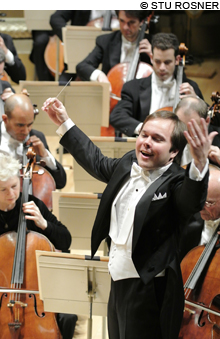
LOVE STORIES Assistant conductor Marcelo Lehninger led the BSO in Leonard Bernstein's Serenade (with Joshua Bell) and Tchaikovsky's "Romeo and Juliet" Fantasy-Overture After Shakespeare. |
The young Brazilian conductor Marcelo Lehninger has been one of the brighter lights among recent Boston Symphony Orchestra assistant conductors, and it's good to report that his appointment has been renewed for a (rare) third year. His tenure got off to a rocky start two years ago when he was assigned to accompany one of the most recalcitrant of celebrity soloists, violinist Pinchas Zuckerman. There's not much any conductor, let alone a relatively inexperienced one, can do with such an inflexible musician. But later concerts, including a last-minute substitution for James Levine leading the world premiere of Harrison Birtwistle's challenging Violin Concerto with Christian Tetzlaff, showed that Lehninger has a musical mind of his own.
So it was good to have him back and in an engaging program, which I trust he had some hand in designing. The concert began with an old warhorse that has been startlingly neglected by the BSO: Tchaikovsky's "Romeo and Juliet" Fantasy-Overtureafter Shakespeare, whose last two BSO subscription performances were in 1989 and 1971, although practically every BSO conductor beginning with the great Arthur Nikisch in 1890 has performed it. Tchaikovsky condensed the Romeo and Juliet plot into 20 minutes of spirituality, swordplay, and ardor. "Our love is like a melody," Frank Sinatra sang on his first demo in 1939, when words were set to the famous love theme (Tommy Dorsey had the hit recording), and practically every movie love scene from silent films through the 1940s used this luscious theme that practically defines romantic music.
The great recording is Toscanini's with the NBC Symphony — sweeping, buoyant, rapturous. Lehninger placed unusual emphasis on its solemn side, but it was ultimately not very involving. He did better with the Dvorák Symphony No. 8 that closed the program, not sounding very Czech, but still rhythmically alive, melodically captivating, and wonderfully played.
In between, Joshua Bell, who was surely responsible for the nearly packed hall, gave us the big solo violin part in Leonard Bernstein's 1954 Serenade (after Plato's "Symposium") for solo violin, string orchestra, harp, and percussion: an attractive paean to various forms of love — ambitious, but maybe not quite ambitious enough. There are moments that sound like Bernstein's Broadway shows, echoes of Wonderful Town or prefigurations of Candide — but nothing as memorable as either. Bell played his "ex-Huberman," a Stradivarius that once belonged to the great Polish violinist Bronislaw Huberman, who could make it sound like a whole orchestra. With Bell, everything sounds the same — smooth, silken, sweet. His tone never changes. Relentlessly pretty becomes tiresome. Bell didn't play the last concert in this four-concert series, which substituted concentration-camp victim Ervín Schulhoff's Concerto for String Quartet (here, the Hawthorne Quartet) with Wind Orchestra for the Bernstein. I'm sorry I didn't get to hear it. Very sorry.